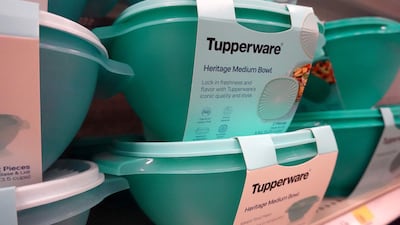Akin to Xerox, Sellotape and Jacuzzi, Tupperware is a brand that has often been used as a generic name and it was considered the ultimate in plastic food containers. “Was” being the operative word here.
On Tuesday, a day after its shares plunged nearly 50 per cent, the company announced it could go out of business as it is failing to appeal to a new generation of consumers — especially amid the myriad other food container options that people can easily find on the shelves at big retail chains.
“I usually buy food storage ware from Home Centre or Ikea,” Saffiya Ansari, a mother of two who lives in Dubai, tells The National. Tupperware is not stocked in these shops and, in any case, Ansari is not particular about opting for a specific brand when it comes to storage containers.
Brand loyalty aside, conscious consumerism is on the rise, with many concerned about the material and carbon footprint of their products. When it comes to storing leftover food, for example, an increasing number of consumers are choosing ceramic or glass containers, which are easier to wash than those made from plastic.
Consumer trends, from health to environment, now influence food container choices. For Ansari, microwaving food in a plastic container is a big no-no.
Numerous studies back this up. According to a 2019 blog by Harvard Medical School: “Certain chemicals in plastic can leach out into the food and beverages we eat.” This leaching could occur “faster and to a greater degree when plastic is exposed to heat.”
Plastic has had a bad rap over the years for its environmental impact. Products such as water bottles and straws are increasingly being made out of stainless steel, bamboo and other reusable materials.
Analysing the discerning buying habits of modern-day consumers, Tricia Jiminea, an entrepreneur and marketer based in Dubai, says: “Specifically for this generation, the trend has been to look beyond the product and see the brand’s purpose before buying into it. Values need to be aligned with the target market, and emotional connections established, instead of just relying on name recall.”
A 2020 survey by market analysis firm Retail Dives showed that 60 per cent of Gen Z consumers consider brands as an expression of who they are, leading to the heightened success of eco-friendly brands such as Aquaflask and Citron.
The latter, a maker of lunch boxes based in Dubai, has built a community of customers who are concerned about what their children use. Hence its slogan: Made by mums, inspired by kids.
“Gen Z and millennials have repeatedly started to opt for eco-friendly food storage options, such as glass containers or reusable silicone bags,” Adel Sajan, group managing director of Danube Group, which owns homeware retailer Danube Home, tells The National.
Design and aesthetics also play a big part in UAE consumers' choices nowadays, he says.
“The use of stainless steel containers is popular in the UAE, as the material is known for its durability and ability to keep food fresh for longer periods.”
Tupperware may have been a household name for years, but some argue it failed to evolve with the times. It was only last year, for example, that it began stocking products with supermarket giant Target, some time after competitors such as New Zealand's Sistema and South Korea's LocknLock.
Evolving consumer preferences and distribution issues aside, product innovation is another cause for concern, as smaller entrepreneurs have come up with varied food storage mechanisms.
All of these factors have led Tupperware to doubt “its ability to continue” despite its seven-decade history. As Sajan puts it: “While Tupperware has served consumers for many years, increased competition and the shift towards aesthetics are here to stay.”

